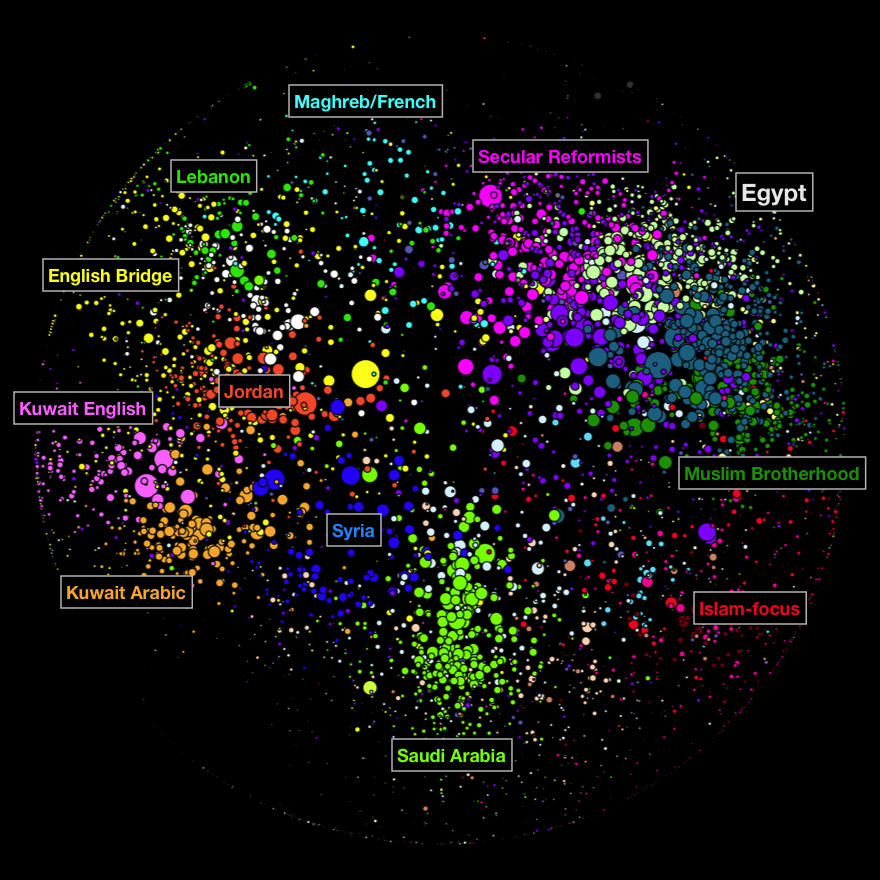UNDP: Social Media, Accountability, and Public Transparency in Eastern Europe and CIS (2011)
Filed under report | Tags: · activism, corruption, eastern europe, internet activism, open data, open government, politics, social media, transparency, web 2.0

The domination of the executive over other branches of the government and the media is frequent in Eastern Europe and the Commonwealth of Independent States (CIS), but the rapid development of social media is changing this pattern by transforming personal conversations and individual opinions into a subject of public debate.
Publisher UNDP Bratislava Regional Centre, October 2011
review (Eva Vozárová, Fair-play Alliance)
PDF
View online (Issuu.com)
Mapping the Arabic Blogosphere: Politics, Culture and Dissent (2009)
Filed under report | Tags: · blogging, culture, egypt, human rights, internet, islam, middle east, networks, politics, religion
“We conducted a study of the Arabic language blogosphere using link analysis, term frequency analysis, and human coding of individual blogs. We identified a base network of approximately 35,000 active blogs, created a network map of the 6,000 most connected blogs, and with a team of Arabic speakers hand coded 4,000 blogs. The goal for the study was to produce a baseline assessment of the networked public sphere in the Arab Middle East, and its relationship to a range of emergent issues, including politics, media, religion, culture, and international affairs.”
Authored by Bruce Etling, John Kelly, Rob Faris, John Palfrey, Internet and Democracy
Published by Berkman Center, June 2009
Internet & Democracy Case Study Series
Berkman Center Research Publication No. 2009-06
62 pages
Circulations of Culture: On Social Distribution of Content: A Research Report (2012) [Polish/English]
Filed under report | Tags: · filesharing, internet, poland

This report reconsiders a vision often encountered in the public debate: that of the cultural sphere destroyed by ‘pirates’ who illegally download and copy books, music and movies. The study was conducted by an interdisciplinary team of sociologists, anthropologists and media theorists from Centrum Cyfrowe Projekt: Polska, led by Mirek Filiciak, Justyna Hofmokl and Alek Tarkowski. Centrum Cyfrowe Projekt: Polska is a Polish non-governmental organization and research institution working with digital technologies towards greater civic and cultural engagement.
The research results demonstrate that the border between legal and illegal circulations of culture are often fluid and undefined – as the internet grows and changes faster than its regulation by the legal system. Three times more Poles participate in informal circulations of culture (mainly online) than they do in formal, market circulations (putting aside the issue of TV viewing). Surprisingly, those who obtain content informally, through the internet are among those who most often buy content in stores.
This report is the first of its kind to demonstrate in detail the character of informal participation of Poles in culture. Based on empirical data we show that the internet is not killing culture in Poland.
(in Polish)
Raport ‘Obiegi kultury. Społeczna cyrkulacja treści’ stawia pod znakiem zapytania obraz świata kultury niszczonego przez ‘piratów’ poprzez nielegalne ściąganie i kopiowanie muzyki, filmów i książek. Przeprowadzone przez zespół badaczy z Centrum Cyfrowego Projekt: Polska badanie pokazuje, że granice między legalnymi a nielegalnymi obiegami kultury są płynne i często niezdefiniowane, bo internet rozwija się szybciej, niż legislacja.
Pomijając telewizję, Polacy aż trzykrotnie częściej korzystają z kultury w sposób nieformalny niż formalny (odpowiednio 39% i 13%) – pożyczając sobie książki, oglądając filmy online lub ‘ścigając’ pliki z Sieci. Co zaskakujące, to właśnie te osoby które najczęściej ‘zdobywają’ treści kulturowe za pośrednictwem internetu również najczęściej kupują książki w księgarni, są klientami sklepów muzycznych i najczęstszymi bywalcami seansów kinowych.
Publikowany raport po raz pierwszy pokazuje nieformalny kontekst uczestnictwa Polaków w kulturze i podważa powtarzaną często tezę, że internet zabija kulturę.
Obiegy kultury. Społeczna cyrkulacja treści: Raport z badań
Written by Mirosław Filiciak, Justyna Hofmokl, Alek Tarkowski
Published by Centrum Cyfrowe, Warsaw, January 2012
Creative Commons License BY-SA 3.0 Polska
100 pages
English edition
Published in September 2012
125 pages
authors
commentary (Glyn Moody, Techdirt, November 2012)
PDF [Polish]
PDF [English]
PDF (datasets, survey) [Polish]
View online (mashup version) [Polish]
View online (mashup version) [English]


